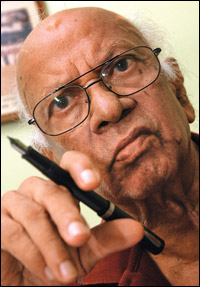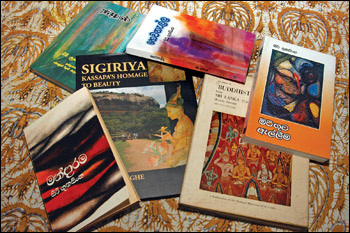|
Siri Gunasinghe felicitated:
Legend of an epoch
A felicitation ceremony in honour of
Prof. Siri Gunasinghe was held at the National Library Services Board
recently organized by Godage Publishers and the University of Ruhuna.
Professors K. N. O. Dharmadasa, Sasanka Perera, Tissa Kariyawasam and
Edwin Ariyadasa paid their tribute to the scholar. Ishara Jayawardane
met Prof. Siri Gunasinghe at his residence and gathered views
Charming, modest and humble scholar now takes his respite at his
residence. Calling him multitalented is in no way an exaggeration. Siri
Gunasinghe is a poet, film director, novelist, art teacher and art
critic all rolled into one.
|

Professor Siri Gunasinghe. Pictures by Ruwan de Silva |
You taught Sanskrit at the Peradeniya
University. How did that help you in your artistic career?
Studying Sanskrit has done me a great service. It gave me a sense of
logic and organization. Unlike modern languages that keep on changing,
Sanskrit is well established. My interest came through my research into
technical manuals on Sanskrit texts dealing with the techniques involved
in early Indian classical paintings. The manuals were in Sanskrit, so I
made a combination with my Sanskrit and Art History. I have a first
class in Sanskrit, but still you can call me a student of Sanskrit.
How had been your childhood and
youth?
I grew up in Galle close to the border of the city. I attended a
village Sinhala school run by the chief monk of the temple. Then I went
to a bilingual school in Ruvanwella, and after that Mahinda College,
Galle. To pursue higher studies I went to the University College. Before
becoming the University of Ceylon, it was just a college. it became a
university only in 1942.
You have expressed your creativity in
many ways: as a poet, filmmaker, novelist, art teacher and art critic.
Which media do you enjoy the most?
Well, literature is my favourite. But there are two. My main interest
is poetry. An artist of any sort needs to express himself. Sometimes the
expression is poetry. Sometimes literature, Sometimes painting. I used
to paint. There is no limit.
You directed one movie and that was
hailed as a masterpiece. Why didnít you produce more films apart from
Sath Samudura?
For one thing I left the country. If I stayed in Sri Lanka maybe I
could have done more. With the new set up in Canada you canít do that.
There were time constraints.
I was teaching at the university, so you have to prepare lectures,
read articles and publications related to the subject. Unlike here where
you can dabble in many things, there you are unable to do that. There is
hardly any time.
Following your return, how do you
continue your work here as an artist?
I have not returned! Although when I come if time permits I attend
other artistic exhibitions. But my own artistic actions, I have no time
to look into it. Other than that I sort of participate in artistic
activities going on in the country but not getting into it as a working
artist because there is no time for that.
|

Siri Gunasingheís literary works |
For instance drama. I could very well get into drama. When I was here
before leaving I took part in drama quite a bit. I could probably do
those things, production, costumes and stage sets. But there are other
people in work. I have neither the time nor inclination to go into these
sort of things.
You are an academic in Sri Lanka as
well as abroad. You have a lot of experience with student life. What do
you think of the present day student politics?
A. I really donít know the situation because I am no longer in the
university or politics to understand what they say. I think
superficially looking into the problem, when we were undergraduates we
did not get involved in national politics largely. But now students are
in the centre of politics. In other words, national politics is sneaking
into the University. They have their preferences and loyalties. The
young people are more enthusiastic and active both mentally and
physically. So there is a big difference now.
Do you see a great difference between
the students now and then?
Very hard question to answer. What I have heard is the students now
are much more politically motivated and some of them are less interested
in learning. These are not my own ideas. What I realize is that the
library is the place where you can judge the attitudes of the students.
I feel the Colombo library is not fully used by the students. Even
the Peradeniya library, undoubtedly the best in Sri Lanka, is not fully
used.
They go to the library, review the lecture notes and read them over
and over again until they learn them by heart. The lecturer lays
emphasis on certain topics making the students imagine that such and
such a question would come. When we were students we did not have that
system.
We used to study previous question papers and it so happens, most of
what we suspected would come, did come. When you open some of the books
in the library you realize that they have not been opened for a long
time. There seems to be a kind of deterioration in learning since they
limit themselves to the lecture notes. |



